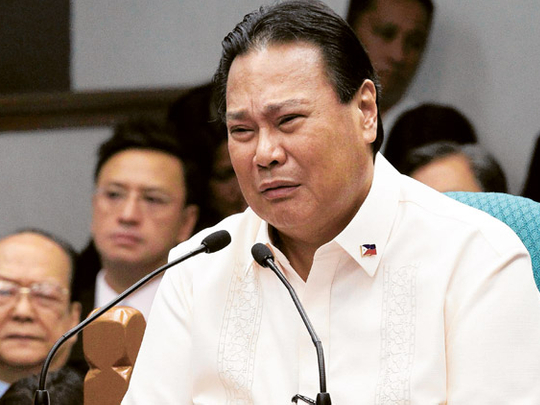
Manila: The Philippines passed a crucial stress-test with the orderly sacking of its top judge, confirming a growing political maturity that is helping drive an economic revival, analysts say.
The Philippine economy has for decades been one of Asia’s biggest underachievers, bedevilled by coups, corruption and political chaos that scared off investors who instead pumped billions of dollars into neighbouring nations.
That is changing, amid a belief that President Benigno Aquino’s heavy focus during his first two years in office on fighting graft and improving standards of governance is starting to pay off.
“This whole commitment of this administration to fight corruption has reverberated and increased confidence,” said Peter Perfecto, head of the Makati Business Club, one of the nation’s most influential business groups.
One of the biggest wins for Aquino came in the last week when the Senate found the Supreme Court’s chief justice, Renato Corona, guilty of hiding more than $4 million (Dh14.68 million) in bank deposits and ordered him to be removed from office.
It was the first time a chief justice had been sacked and, remarkably for a country so used to political turmoil, passed with barely a whimper of a street protest and the military remaining respectfully silent.
“It was indeed an achievement to have the process completed without extra-constitutional efforts,” said Steven Rood, country representative of the Asia Foundation, a US-based group that promotes governance in the region.
When a bloodless “people power” revolt ended Ferdinand Marcos’ 20-year rule and revived democracy in 1986, it also convinced Filipinos that extra-legal shortcuts were the most effective way to resolve major political crises.
Corazon Aquino, the incumbent leader’s late mother, stared down military rebels and multiple coup attempts during her six years in office after replacing Marcos.
In 2001, military-backed street protests ousted then-president Joseph Estrada after his Senate impeachment trial for corruption broke down.
This led to the ascension of Gloria Arroyo, who survived three military rebellions but ended her near-decade in power in 2010 with a reputation for being corrupt. She has since been charged with vote-rigging.
She denies accusations of corruption.
Benigno Aquino has been able to maintain political stability because people and institutions largely believe his anti-graft campaign is delivering results.
“The current administration was elected on a platform that anti-corruption is the best economic strategy, and they continue to pursue that policy direction,” the Asia Foundation’s Rood said.
Other significant developments in Aquino’s drive include overhauling the budget disbursement system, reviewing Arroyo-era government contracts and naming an ex-Supreme Court justice as chief anti-corruption prosecutor.
He also named reformist bureau chiefs at the country’s main revenue-collection agencies, which have been aggressively filing cases against alleged big-time tax evaders and smugglers.
Crisanto Frianeza, secretary-general of the Philippine Chamber of Commerce and Industry, praised Aquino’s efforts to cut red tape, a key obstacle that breeds corruption.
“Local governments are instituting a system that makes it easier to register a business. It still needs a lot of work, but compared to before, we already have a good system,” Frianeza said.
Analysts say that, amid all the reforms, it is no coincidence that foreign direct investments jumped 153.7 per cent annually to $850 million in the first two months of this year.
The economy also grew 6.4 per cent in the first quarter, topping all forecasts and one of the best-performing in Asia, while stock prices have hit record highs, up 14 per cent this year.
Major credit-rating agencies have made six positive actions on the Philippines since Aquino came to office.
The latest, Moody’s upgrade on the Philippine outlook to positive from stable, came on the same day that the Senate sacked Corona.
Nevertheless, economists and analysts acknowledge that huge challenges remain.
Debt is still two rungs below investment grade and the World Bank’s International Finance Corporation rates the Philippines 136th globally among 183 economies in terms of ease of doing business.
Most crucially, even Aquino admits that the war on graft will take many years to win.
Corruption watchdog Transparency International ranked the Philippines the 129th most corrupt country out of 183 in 2011, slightly up from 134th the previous year.











